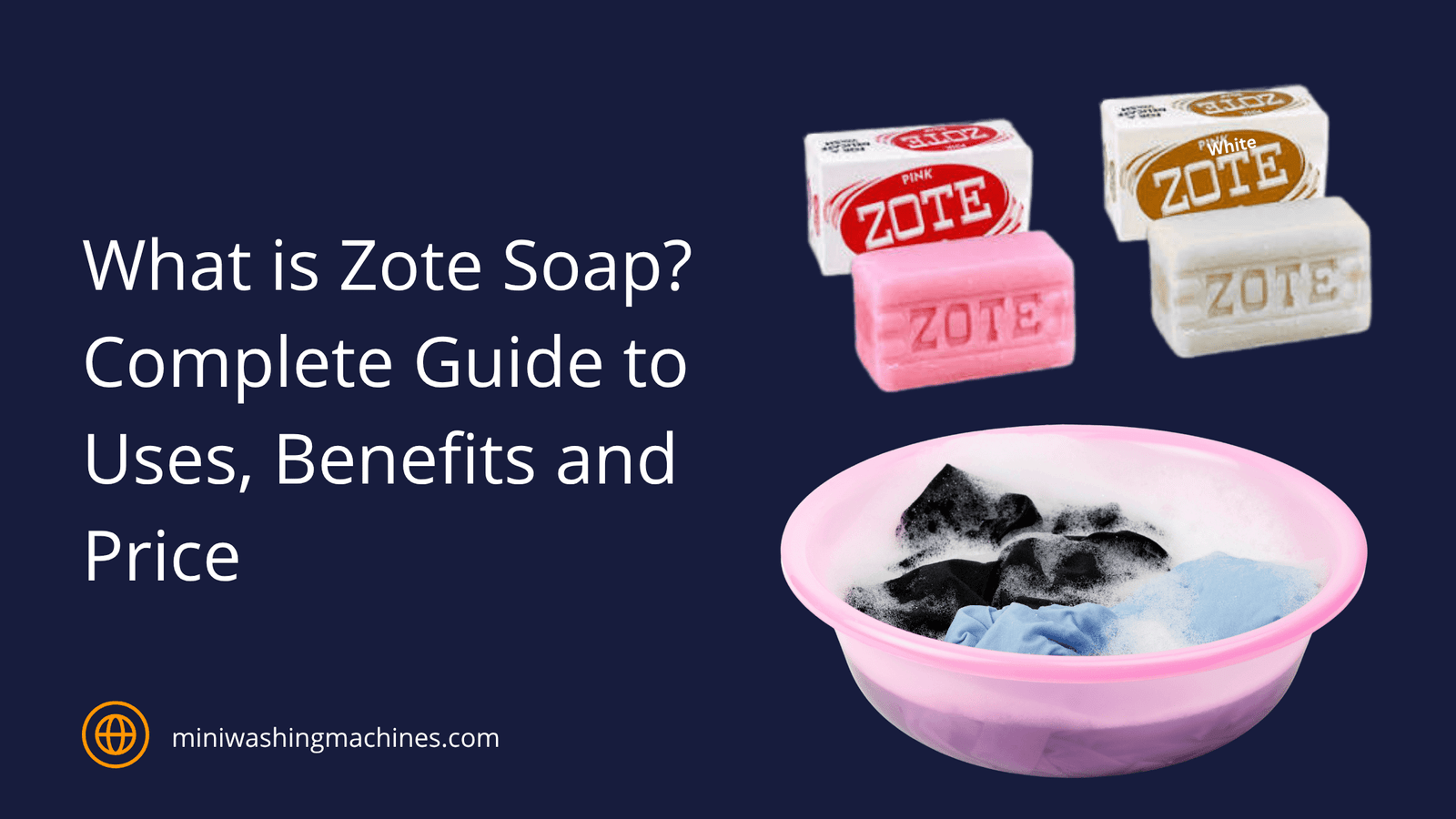Zote soap was first made in Mexico in 1970. It is a product of the Fabrica de Jabon La Corona company, which has been making soap in Mexico for decades. Zote Soap is based on natural ingredients. It is primarily used for cleaning clothes, removing stains, and making DIY laundry detergents. It is especially effective for delicate garments such as sweaters and knitwear.
It usually comes in two colors:
- Pink Zote (original and popular)
- White Zote (more neutral)
Uses of Zote Soap
Zote soap is loved all over the world for its excellent cleaning, natural ingredients and softness. It is not limited to washing clothes, but has many amazing uses.
Use for laundry
Zote soap is primarily made for washing clothes, and is unmatched in this task:
- Use Zote soap to remove stubborn stains. Be it oil, grease, blood, grass or any other stain. Rub Zote soap on the stains, leave it for a while, then wash. The result will be amazing.
- This soap is not harsh on the hands, so it is perfect for washing clothes by hand. The fatty acids in it make clothes soft and shiny.
- Cut the soap into thin pieces or grind it and use it in the machine. It is the best natural alternative to synthetic soap, especially for those who are allergic to chemicals.
- Zote soap can also be safely used on silk, wool and other delicate fabrics.
- Zote soap has no strong fragrances or chemicals, so it is perfect for delicate baby clothes and people with sensitive skin.
Other household uses (non-laundry uses)
The magic of Zote soap is not limited to clothes, but also helps with household chores:
- Especially for non-stick cookware, as it does not damage their surface. It cleans grease and oil well.
- If you have been gardening, repairing a car or doing any other dirty work, washing your hands with Zote soap is useful and gentle.
Household cleaning
- Restore the shine of floors and tiles by dissolving it in warm water.
- It is also useful for cleaning bathtubs, sinks and toilets.
- Can also be used on kitchen counters and shelves.
- Some people try Zote soap to avoid chemical shampoos. It helps keep hair clean, soft and free of dandruff. But use a small amount and test first.
- People who are allergic to regular soap can also use it as a body soap. It keeps the skin soft.
- Dissolve one tablespoon of Kadukash Zote soap in a liter of water, fill it in a spray bottle and spray it on the plants. The insects will run away.
- This is great for washing and keeping the brushes soft.
- Gently clean lightweight jewelry with Zote soap solution.
- Small stains on carpets or doors can be easily removed with Zote soap.
Zote Laundry Soap Price
If you are looking for an effective, and readily available laundry soap, Zote Soap is a great choice for you. It is available online and in physical stores, some store names are: Walmart, Amazon, Target, and more.
We tell you the price of Zote soap to make shopping easier for you:
| Store | Price | Availability | Additional Info |
|---|---|---|---|
| Walmart | $1.28 to $1.50 per bar | In-store and online | N/A |
| Amazon | $2.20 to $12.99 | Online only | 1-Bar, 3-Pack, 6-Pack Free with Prime |
| Target | $1.39 to $1.59 | In-store and online | N/A |
| Mexican/Hispanic Stores | $0.89 to $1.10 | Local stores | N/A |
This soap is made in Mexico, so it is often available at low prices in Hispanic community stores.
If you’re buying Zote for regular use, buying a 6-Pack or 12-Pack reduces the cost per bar. Plus, it doesn’t spoil for a long time, so it’s easy to store.
Zote Soap Ingredients and Difference Between Pink Zote Soap and White Zote Soap
Zote soap, whether it is pink or white, is an excellent and versatile soap. Apart from the difference in color and fragrance, the cleaning power and household uses of both are almost the same. You can choose either of them according to your preference and need. If you are allergic to fragrance or color, then white Zote is the better choice. It mainly consists of a few key ingredients, which are responsible for its excellent cleaning ability.
The main ingredients included in Zote soap are as follows:
- Sodium Tallowate (sodium salt of animal fat)
- Sodium Cocoate (sodium salt of coconut oil)
- Glycerin
- Citronella oil (fragrance)
- Optical brightener
- Sodium chloride (salt)
- Dye
Sodium Tallowate (sodium salt of animal fat): It is derived from fat and gives the soap its cleaning power and foaming ability. It also provides hardness to the soap.
Sodium Cocoate (sodium salt of coconut oil): It is derived from coconut oil. It also plays an important role in cleaning and foaming and makes the soap feel soft.
Glycerin: This is a natural byproduct of the soap-making process (soap making). Glycerin is a “humectant,” meaning it absorbs moisture from the air and helps keep skin soft and supple. This is why Zote soap doesn’t feel harsh on hands.
Citronella oil (fragrance): This is a natural oil that gives soap its light, pleasant lemon scent. Citronella also has mosquito-repelling properties.
Optical brightener: This is a chemical compound that helps clothes look brighter and whiter, especially on white clothes. It doesn’t remove stains, but rather reflects light and makes clothes brighter.
Sodium chloride (salt): This helps the soap set (harden).
Dye: Pink dye is added to Pink Zote soap, while White Zote soap doesn’t have any dye added.
Difference between Pink Zote and White Zote Soap
Basically, the cleaning ability and ingredients of Pink and White Zote soap are almost the same. The main differences are found in the following points.
1. Color:
Pink Zote: It has a pink color added to it.
White Zote: No color is added, it is a natural off-white or cream color.
2. Fragrance:
Pink Zote: It has a high or significant concentration of citronella oil, which gives it a distinctive soft and refreshing scent. Some people liken it to a “floral” or “pink” scent.
White Zote: It is usually “unscented” or low-scented. It contains either very little or no citronella oil, which is better for people who are allergic to fragrances or who prefer unscented products.
3. Suitable for sensitive skin:
White Zote: Since it contains no or very little dye and fragrance, it is considered more suitable for people with sensitive skin and delicate children’s clothing.
Pink Zote: Although it is also a mild detergent, the dyes and fragrances it contains may cause sensitivities in some people.
4. Cleaning power:
There is no significant difference in the cleaning power of the two colors of Zote soap. Both are effective in removing stains and cleaning clothes. Both contain optical brighteners that make clothes shine.
Some people feel that pink Zote is cleaner or better at removing stains, but this is mostly a matter of personal experience or preference, there is no major difference in the actual ingredients.
Is Zote Soap Toxic? (For Skin, Kids, and the Environment)
Zote soap is generally considered non-toxic, especially compared to the chemical soaps that are commonly available in the market. Provided that it is used for the purpose for which it is made, which is to wash clothes. Its natural composition and eco-friendly properties make it a better and safer choice than synthetic soaps. However, there are some precautions that you should know before using it.
1. Generally safe for skin
Zote soap contains natural ingredients like sodium tallowate (made from animal fat), sodium cocoate (from coconut oil), and glycerin. Glycerin helps keep the skin soft, which is why people use it to wash their hands, even in the shower.
Those with dry or sensitive skin beware:
Although it is considered gentle, Zote is primarily a laundry soap, not a regular moisturizing body soap. Its alkaline properties (basic nature) can disrupt the skin’s natural pH balance. For people with sensitive skin, frequent or prolonged use may cause dryness, itching, or mild irritation.
Be sure to do a patch test before using directly on your skin:
If you want to use it directly on your skin, be sure to do a “patch test” on a small area of skin first, especially if you have sensitive skin.
Know this before using for acne:
Some people use Zote soap for facial blemishes, but it is not recommended. Its alkaline nature can strip the skin of essential oils, which can dry out the skin and sometimes make blemishes worse. It does not contain ingredients that are specifically formulated to treat acne.
2. Considered safe for baby clothes
Zote soap is considered safe for washing baby clothes because it contains minimal harsh chemicals, phosphates, or artificial fragrances, which can irritate baby’s delicate skin. White Zote soap, which contains less fragrance and color, is a better choice for baby clothes.
Be careful when using directly on the skin:
A baby’s skin is extremely delicate. Although Zote is a gentle soap, it should be avoided by applying it directly to baby’s skin. The citronella or optical brighteners it contains can irritate baby’s skin. It is best to use pure and unscented baby soap.
Wash baby clothes thoroughly:
If you wash baby clothes with Zote soap, it is important to rinse them thoroughly so that no soap residue remains.
Zote soap or any cleaning products should be kept out of reach of children. If a child accidentally swallows it, contact a doctor or poison control center immediately.
3. Naturally biodegradable and considered environmentally safe:
Zote soap is considered environmentally safe because its main ingredients, such as sodium talc and sodium cocoate, are naturally biodegradable. They do not contain harsh chemicals that can leach into water and harm aquatic life.
It has a very low chemical load:
Zote soap has a very low chemical load compared to modern detergents, making it a better choice for the ecosystem and aquatic life.
Zote Soap also contains optical brighteners:
Zote contains “optical brighteners” that brighten clothes. Although some environmental organizations question their use, because they can accumulate in water, their effect is much less than that of traditional soap.
Zote soap comes in solid bar form, which reduces the need for plastic packaging, which helps reduce plastic pollution.
Remember, like any cleaning product, Zote soap should be used wisely and with caution.
FAQS
Used for laundry, house cleaning, makeup brushes, and hand washing.
Fish don’t like soap – it can be harmful to them.
Zote soap was introduced in Mexico in 1970 and became popular as a laundry soap.
Fine for normal skin, but caution is necessary when using on sensitive or dry skin.

